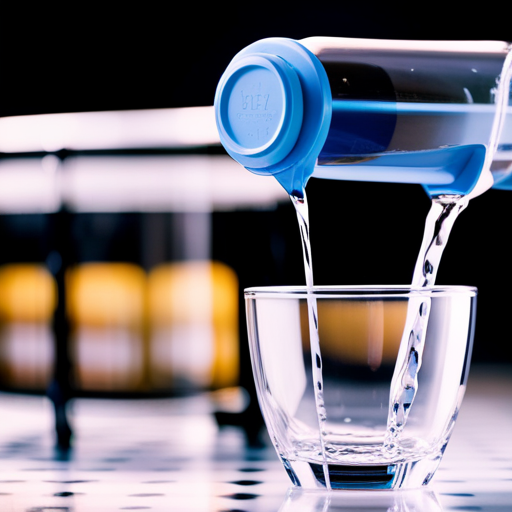If you’re tired of the unpleasant taste and smell of chlorine in your tap water, ZeroWater filters may be just what you need. These filters use a unique 5-stage process to remove contaminants from your drinking water, including chlorine, chloramine, and mercury.
With ZeroWater filters, you can enjoy the taste and purity of bottled water without the expense or environmental impact.
The key to ZeroWater’s effectiveness lies in its advanced filtration process. Unlike other filters that may only remove some of the contaminants in your water, ZeroWater filters use a combination of activated carbon and ion exchange resins to remove virtually all impurities down to 0-1 ppm.
This results in clean, pure water that is free from the taste and odor of chlorine, as well as other common contaminants like lead, chromium, and arsenic.
So if you’re looking for a simple, affordable way to improve the quality of your drinking water, ZeroWater filters may be the solution you’ve been searching for.
Key Takeaways
– ZeroWater filters remove 99% of chlorine from tap water through their 5-stage process.
– Stage 3 of the filtration process specifically targets the removal of chlorine, chloramine, and mercury.
– ZeroWater filters should be replaced every 3 to 4 months or after filtering 40 gallons of water to maintain their efficiency in removing contaminants.
– Filtering tap water is important to avoid unwanted contaminants or particles, such as chlorine, which is added by water companies for disinfection purposes.
Removal of Chlorine
If you’re concerned about chlorine in your tap water, you’ll be relieved to know that ZeroWater filters have got you covered. By using a 5-stage filtration process, ZeroWater filters can remove 99% of chlorine from your tap water.
Stage 3 of the filtration process is dedicated to removing chlorine, chloramine, and mercury, so you can rest easy knowing that your water is free from these harmful substances. Chlorine exposure risks are a real concern for many people, as long-term exposure to chlorine has been linked to health problems such as cancer and respiratory issues.
While there are alternative methods for chlorine removal, such as boiling water or using a reverse osmosis system, these methods can be time-consuming and expensive. With ZeroWater filters, you can easily and affordably remove chlorine from your tap water, ensuring that you and your family are drinking water that’s not only safe but also tastes great.
Filtration Process
To filter your tap water effectively, you need to understand the five-stage filtration process used by ZeroWater filters. This process is designed to remove a wide range of contaminants from your tap water, including organic and inorganic compounds, metals, non-metals, and radiological contaminants. Here’s how it works:
– The first stage of the filtration process uses a coarse filter screen to remove large particles and sediment from your tap water.
– The second stage uses a foam distributor to evenly distribute the water across the surface of the filter, ensuring that it’s filtered evenly.
– The third stage is where the real magic happens. This stage uses a multi-layered activated carbon and oxidation reduction alloy to remove chlorine, chloramine, and mercury from your tap water. This is one of the key benefits of ZeroWater filters, as other filtration methods may not remove all of these contaminants.
– The fourth and fifth stages use a dual comprehensive ion exchange resin and an ultra-fine screen and non-woven membrane layers to remove any remaining contaminants from your tap water.
It’s important to note that the lifespan of your ZeroWater filter will depend on your usage. However, when compared to other filtration methods, ZeroWater filters are often more effective at removing a wider range of contaminants from your tap water. So if you’re looking for a way to ensure that your drinking water is free of contaminants like chlorine, ZeroWater filters may be the perfect solution for you.
Maintaining Filter Efficiency
Keeping your filter efficient is important for ensuring clean and safe drinking water. To prolong the lifespan of your ZeroWater filter, it’s recommended to replace it every 3 to 4 months or after filtering 40 gallons of water, depending on usage.
Writing down when to replace filters and putting it on the refrigerator can help avoid forgetting. Signs of a bad filter include an acidic or lemony taste, cloudy water, foul or off smell, metallic or off taste, and a meter reading of at least 006 ppm. If you notice any of these signs, it’s time to replace your filter to maintain its efficiency in removing contaminants like chlorine.
In addition to replacing your filter regularly, it’s also important to monitor the Total Dissolved Solids (TDS) levels in your water. The FDA requires filters to have a TDS of approximately 200 ppm or less to be called filters, while bottled water is required to be between 0 to 1 ppm.
Tap water is typically 500 ppm, while anything above 1,000 ppm is considered dangerous and undrinkable. Monitoring your TDS levels and ensuring they are within safe ranges can help ensure that your ZeroWater filter is working properly to remove contaminants like chlorine and provide you with clean, safe, and great-tasting drinking water.
Conclusion
Now that you know how ZeroWater filters work, you can say goodbye to the unpleasant taste and smell of chlorine in your drinking water. With its 5-stage filtration process, ZeroWater filters can effectively remove not only chlorine but also other contaminants down to 0-1 ppm.
This means that you can enjoy clean, pure drinking water that meets FDA regulations for bottled water. To maintain the efficiency of your ZeroWater filter, make sure to replace it when the TDS meter reads 006 or when you notice a change in taste or odor of your water.
By doing so, you can ensure that your ZeroWater filter is working at its best to provide you with the ultimate solution for chlorine-free drinking water. So start using ZeroWater filters today and experience the difference in the taste and quality of your drinking water.
